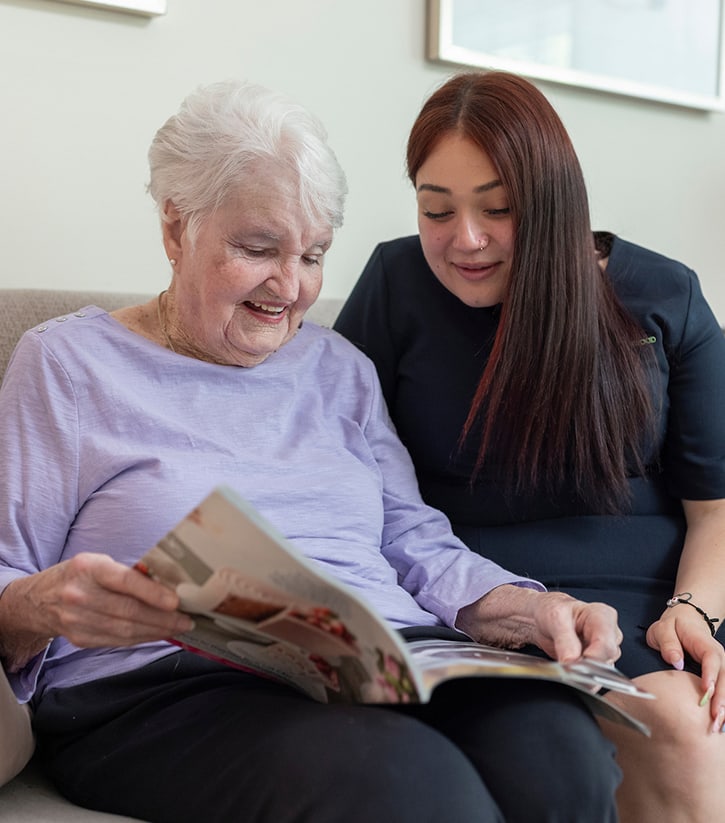Watching a parent struggle with communication can be overwhelming. You may notice them searching for words, speaking less at family dinners, or getting frustrated when trying to express themselves. Changes in speech and communication are common and manageable.
As we age, conditions like dementia, stroke, or normal aging can impact speech and language. Hearing loss or other health issues can also make communication harder.
Understanding these changes and knowing what support is available can make a big difference for you and your parent.
Why Aging Parents May Have Trouble Speaking
As we age, several factors can make communication more difficult. Common causes include:
- Neurological conditions such as stroke, Parkinson’s, or dementia can cause slurred speech, softer voices, or language difficulties
- Medication side effects may cause dry mouth, drowsiness, uneven speaking, or cognitive changes that affect speech
- Hearing loss can impact speech volume & clarity, creating frustrating communication barriers that can lead to social withdrawal
- Physical changes like dental issues, poorly fitting dentures, or weakened mouth muscles can make speaking difficult
Recognizing these causes can help address speech challenges and improve communication.
Signs to Look Out For
Spotting early signs of communication challenges can help address issues before they worsen. Signs to watch for include:
- Word-finding difficulties like pausing mid-sentence or using vague terms like “that thing” or “that person”
- Changes in speech patterns like speaking more slowly, using shorter sentences, or repeating phrases
- Voice changes like speaking quietly, mumbling, sounding hoarse, or in a monotone voice
- Social withdrawal like avoiding phone calls, gatherings, or conversations & staying unusually quiet in groups
- Frustration during conversations such as getting upset or giving up when trying to express themselves
If you notice these signs, seek professional support early. Early intervention makes a difference.
Communication Strategies & Tools
Active listening is key. Give your parent your full attention, maintain eye contact, and don’t interrupt. Remember these active listening strategies:
- Ask simple questions with yes or no answers
- Instead of “What would you like to do today?” ask “Would you like to go for a walk?”
- Allow extra time for responses
- Avoid rushing, which can lead to frustration and make communication more difficult
- Use visual cues to respect their autonomy
- Use gestures, writing, or pointing to familiar objects to help when words fail, instead of interrupting
- Be patient & positive to encourage their participation
- Use phrases like “I can see you’re trying to tell me something,” instead of finishing their sentences
Assistive Devices & Technologies
Modern technology offers numerous solutions to address communication challenges, including:
- Speech-generating devices to assist individuals with severe speech difficulties, ranging from simple picture boards to advanced tablets with voice output capabilities
- Amplification devices to boost volume for more explicit conversations, using personal or voice amplifiers
- Communication apps on smartphones or tablets can offer visual support, word prediction, or text-to-speech features
- Writing tools like whiteboards, notebooks, or digital tablets work as backup communication methods

Seeking Professional Help
Involve healthcare professionals if communication challenges arise, such as the following:
- Speech-language pathologists (SLPs) can assess speech & language issues to create therapy plans
- Audiologists evaluate hearing loss & recommend hearing aids or assistive devices to improve communication
- Occupational therapists can help with fine motor skills for writing or using communication devices & suggest ways to simplify daily communication
- Neurologists should be consulted for potential neurological conditions; early diagnosis & treatment can slow progression & improve outcomes
Emotional & Social Support
Communication challenges can be tough for both you and your parent. Support groups for families can offer practical tips and emotional support:
- Counseling services can help your parent manage frustration & maintain well-being
- Family counseling can also help everyone adapt to new communication patterns & feel heard
- Social activities tailored to different abilities can help maintain connections
- Check senior centers for programs designed for those with communication challenges
Preparing for the Future
As communication needs may change over time, it’s essential to plan. Discuss preferences while your parent can still communicate their wishes. Your plan should include decisions about care, living arrangements, and medical treatments.
Create communication cards that include essential information, such as medical conditions, medications, and emergency contact details. These can be invaluable if communication becomes more challenging.
Explore long-term care options that specialize in communication support. Not all communities are equipped to handle complex communication needs.
How Senior Living Communities Support Communication Challenges
Senior living communities offer valuable support for residents with communication challenges. At The Hidenwood, trained staff know how to communicate effectively with residents facing speech difficulties. We can offer:
- Social programs, like group activities, reading, & conversation circles, help residents maintain communication skills in an inclusive setting
- On-site healthcare services, often including speech therapy, audiology, & other specialists, allowing consistent care to be easily accessible
- Communication aids & adaptive technologies are available, with staff trained to use them effectively, helping residents express their needs.
Above all, it’s about treating people the way they deserve: with a warm, patient approach, fostering an environment where residents feel comfortable communicating without fear or pressure.
Moving Forward & Connecting with Confidence
At The Hidenwood, we know that addressing communication challenges early often leads to healthier outcomes.
Start by having an honest conversation with your parent about any concerns they have. Schedule a hearing test and consider consulting with a speech-language pathologist for a comprehensive evaluation.
Contact us today to learn how we can provide you with proper support and resources to help your loved one’s voice continue to be an essential part of family conversations and daily life.














